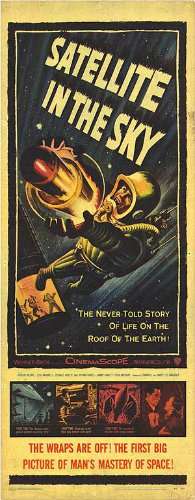Satellite in the Sky
| Satellite in the Sky | |
|---|---|
 | |
| Directed by | Paul Dickson |
| Produced by |
Edward J. Danziger Harry Lee Danziger |
| Written by |
John Mather J.T. McIntosh Edith Dell |
| Starring |
Kieron Moore Lois Maxwell Donald Wolfit Bryan Forbes |
| Music by | Albert Elms |
| Cinematography |
Georges Périnal James Wilson |
| Edited by | Sidney Stone |
Production company | |
| Distributed by | Warner Bros. |
Release dates | 1956 |
Running time | 84 minutes |
| Country | United Kingdom |
| Language | English |
Satellite in the Sky is a 1956 British CinemaScope science fiction film in WarnerColor from Warner Bros. Pictures that was produced by Edward J. Danziger and Harry Lee Danziger and was directed by Paul Dickson. The film stars Kieron Moore, Lois Maxwell, Donald Wolfit, and Bryan Forbes. Special effects were by Wally Veevers, who would later work on Stanley Kubrick's 2001: A Space Odyssey (1968).[Note 1][2] [Note 2]
Plot
After initial experiments using high-speed aircraft, scientists in Great Britain create the "Stardust", the first manned spaceship to orbit the Earth. Some of the crew members have concerned loved ones. Barbara (Thea Gregory), the wife of Larry Noble (Jimmy Hanley), and Ellen (Shirley Lawrence), the girlfriend of radio operator Jimmy Wheeler (Bryan Forbes), are afraid that the space flight will be dangerous.
Although the crew, headed by Commander Michael Haydon (Kieron Moore), initially believe they are on a scientific mission, the scientist on board, Professor Merrity (Donald Wolfit), is really working for the United States to test an experimental nuclear "Tritbonium Bomb". The object is to use the explosion to persuade nations to abandon nuclear weapons.
Complications arise when Haydon discovers a stowaway. Troublesome reporter Kim Hamilton (Lois Maxwell) also opposes the mission as a reckless and unnecessary use of space flight, and has hidden aboard to disrupt the mission.
The Tritbonium Bomb is to be released into space, but when the experimental spaceship's propulsion unit fails and the bomb has attached itself to the hull, everyone's life is threatened. The crew and their unwanted guest race against time to defuse or destroy the bomb.
Cast
- Kieron Moore as Commander Michael Haydon
- Lois Maxwell as Kim Hamilton
- Donald Wolfit as Professor Merrity
- Bryan Forbes as Jimmy Wheeler
- Jimmy Hanley as Larry Noble
- Barry Keegan as "Lefty" Blake
- Donald Gray as Captain Ross
- Thea Gregory as Barbara Noble
- Shirley Lawrence as Ellen
- Alan Gifford as Colonel Galloway
- Walter Hudd as Professor Blandford
- Carl Jaffe as Professor Bechstein
- Peter Neil as Tony
- Ryck Rydon as Reporter (credited as Rick Rydon)
- Ronan O'Casey as Reporter
- Robert O'Neil as Reporter
Production
Satellite in the Sky was the first British science fiction film to be shot in Cinemascope and WarnerColor. Footage of the Avro Vulcan[Note 3] and the Folland Midge, the prototype for the later Folland Gnat aircraft series, was featured in the beginning of the film, as scientists push the envelope of high-speed flight and test exotic rocket fuels. The Midge portrays a fictional jet fighter used to test an experimental fuel. Wally Veevers' extensive model work with miniatures and matte paintings is notable. The model rocket looks futuristic, though a familiar period design, using a long, angled ramp (ala When Worlds Collide) to launch the rocket into space.[2]
Reception
Bosley Crowther of The New York Times described the weakness in the plot: "the trouble with this film is that it makes space travel so simple that it is without surprise or kick."[3]
Film critic Leonard Maltin called Satellite in the Sky "elaborate but unexciting."[4] The review in Video Movie Guide 2002 called it a "Tedious sci-fi adventure memorable for a fun performance by Donald Wolfit as the bomb's eccentric inventor."[5]
See also
References
Notes
- ↑ Walter Joseph "Wally" Veevers had a long and highly respected career in special effects that began with Things to Come (1936) and ended with The Keep (1983).[1]
- ↑ Lois Maxwell would later gain fame playing Miss Moneypenny in the James Bond series of films.[2]
- ↑ The second Avro Vulcan B.1, XA890 appeared in the film.
Citations
- ↑ "Wally Veevers." British FIlm Institute (BFI). Retrieved: 17 May 2015.
- 1 2 3 Miler, Frank. "Articles: 'Satellite in the Sky'." Turner Classic Movies. Retrieved: 16 May 2015.
- ↑ Crowther, Bosley. "Movie Review: 'Satellite in the Sky' (1956); The Screen; 'Satellite in the Sky' lands at the Globe." The New York Times, 4 September 1956.
- ↑ Maltin, Leonard. "Leonard Maltin movie Review: 'Satellite in the Sky'." Turner Classic Movies. Retrieved: 16 May 2015.
- ↑ Martin and Porter 2002, p. 462.
Bibliography
- Martin, Mick and Marsha Porter. Video Movie Guide 2002. New York: Ballantine Books, 2002. ISBN 0-345-42100-0.